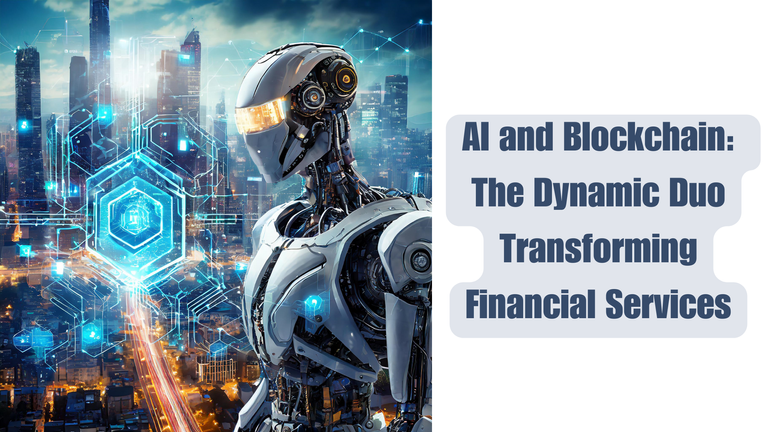AI and Blockchain: The Dynamic Duo Transforming Financial Services


Introduction
The integration of Artificial Intelligence (AI) and blockchain technology is poised to revolutionize the financial services sector. As these technologies continue to advance and mature, their potential to transform the way financial institutions operate and serve their customers becomes increasingly evident. This article will delve into the benefits, challenges, and future outlook of this transformative duo in the world of finance, providing a comprehensive understanding of how AI and blockchain are reshaping the industry.


AI and Blockchain Technology: A Powerful Combination
At its core, blockchain technology provides a secure, decentralized ledger for transactions, ensuring transparency and immutability. On the other hand, AI excels at analyzing vast amounts of data, detecting patterns, and making intelligent decisions. When combined, these technologies offer a powerful solution for the financial services sector. Blockchain's decentralized and tamper-proof nature, coupled with AI's ability to detect fraud and suspicious activity, creates a secure platform for financial transactions, instilling trust and confidence in the system.
Benefits of AI and Blockchain in Financial Services
The benefits of integrating AI and blockchain in financial services are numerous and far-reaching:
- Improved Security: Blockchain's decentralized and immutable ledger, combined with AI's ability to detect and prevent fraudulent activities, offers a robust and secure platform for financial transactions. This enhanced security measures help protect both financial institutions and their customers from potential threats and breaches.
- Increased Efficiency: AI-powered automation streamlines processes, reduces manual errors, and speeds up transactions. Simultaneously, blockchain's ability to facilitate faster and cheaper transactions further optimizes operational efficiency. This combination of AI and blockchain significantly improves the speed and efficiency of financial services, benefiting both institutions and customers alike.
- Enhanced Customer Experience: AI enables personalized financial advice, tailored investment recommendations, and proactive customer support. Blockchain, on the other hand, enables real-time account access, faster transactions, and increased transparency. Together, these technologies elevate the customer experience, providing a more convenient, secure, and personalized approach to financial services.
Challenges of Integrating AI and Blockchain in Financial Services
Despite the numerous benefits, integrating AI and blockchain in financial services comes with its own set of challenges:
- Regulatory Compliance: The financial services industry is heavily regulated, and the adoption of new technologies often requires navigating complex regulatory landscapes. Financial institutions must ensure that the integration of AI and blockchain complies with existing regulations and guidelines, which can be a time-consuming and costly process.
- Adoption and Implementation: Adopting AI and blockchain technologies requires significant investments in infrastructure, talent, and training. Financial institutions must overcome organizational inertia, address concerns about security and privacy, and convince both internal stakeholders and customers of the benefits of these technologies. This process can be challenging, requiring a clear strategy and a willingness to embrace change.
- Interoperability and Standardization: As different financial institutions adopt AI and blockchain technologies, ensuring interoperability between various systems and platforms becomes crucial. The lack of standardization in the industry can hinder seamless integration and data sharing, requiring substantial efforts to establish common protocols and standards.


Case Studies: Successful AI and Blockchain Implementations in Finance
Despite the challenges, several financial institutions have successfully implemented AI and blockchain technologies, paving the way for industry-wide adoption:
- JPMorgan Chase: JPMorgan Chase has developed a blockchain-based platform called Interbank Information Network (IIN), which enables secure and efficient information sharing among participating banks. This platform leverages blockchain technology to reduce friction in cross-border payments and improve the overall efficiency of interbank communication.
- Ant Financial: Ant Financial, a subsidiary of Alibaba Group, has integrated AI into its lending decisions. By analyzing vast amounts of data, including transaction history and social media activity, Ant Financial's AI algorithms can assess creditworthiness and make informed lending decisions, expanding access to credit for underserved populations.
Future Outlook: A More Secure, Efficient, and Customer-Centric Future of Financial Services
As AI and blockchain technologies continue to evolve and mature, their integration into financial services is expected to accelerate. Financial institutions that embrace these technologies will be well-positioned to offer more secure, efficient, and customer-centric services. The future of financial services will likely be characterized by increased automation, real-time transactions, and personalized experiences, all underpinned by the power of AI and blockchain.
Regulatory Challenges and Solutions
Navigating the regulatory landscape is a significant challenge for financial institutions seeking to integrate AI and blockchain. To address this, institutions can proactively engage with regulators, participate in industry associations, and collaborate with peers to develop best practices and standards. By working closely with regulatory bodies and contributing to the development of guidelines and frameworks, financial institutions can help shape the future of AI and blockchain regulation in the industry.

Conclusion
The integration of AI and blockchain technology holds immense potential for revolutionizing the financial services sector. By leveraging the benefits of improved security, increased efficiency, and enhanced customer experience, financial institutions can position themselves for success in the digital age. While challenges related to regulation, adoption, and interoperability persist, proactive engagement and collaboration among industry stakeholders can help overcome these hurdles. As we look towards the future, the combination of AI and blockchain is set to redefine the way financial services are delivered, ushering in a new era of innovation and growth in the industry.


Source
What is the impact of AI and Blockchain on financial services?

Blog Banner created by me, using my Canva Pro account
INLEO Animated Divider is courtesy of @ doze
All other images were Adobe Firefly, Dall-E 3, and/or Photosonic generated using my prompts
Posted Using InLeo Alpha